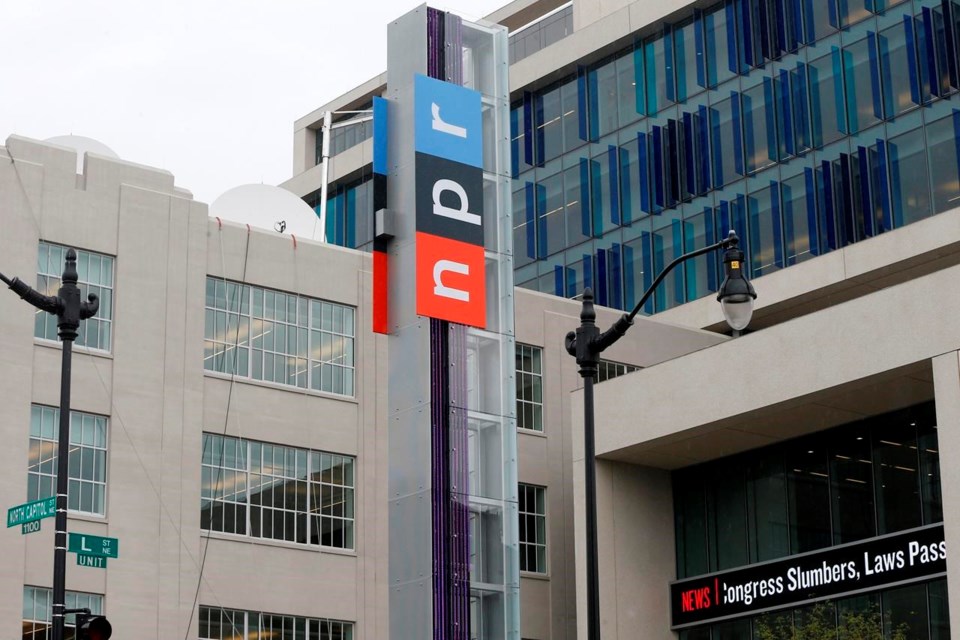WASHINGTON ŌĆö National Public Radio is quitting Twitter after the social media platform stamped NPR's account with labels the news organization says are intended to undermine its credibility.
Twitter " a term also used to identify media outlets controlled or heavily influenced by authoritarian governments, such as Russia and China. Twitter later changed the label to ŌĆ£government-funded media,ŌĆØ but to NPR ŌĆö which relies on the government for a tiny fraction of its funding ŌĆö itŌĆÖs still misleading.
NPR said in a statement on Wednesday that it ŌĆ£will no longer be active on Twitter because the platform is taking actions that undermine our credibility by falsely implying that we are not editorially independent.ŌĆØ
ŌĆ£Defund @NPR,ŌĆØ was Musk's tweeted response. His latest tiff with a news organization reflects a gamble for the social media platform he bought last year.
Twitter, more than any of its rivals, has said its users come to it to keep track of current events. That made it an attractive place for news outlets to share their stories and reinforced TwitterŌĆÖs moves to combat the spread of misinformation. But Musk has long expressed disdain for professional journalists and said he wants to elevate the views and expertise of the ŌĆ£average citizen."
The Public Broadcasting Service said Wednesday it has also stopped tweeting from its main account and that the public TV organization has no plans to resume because ŌĆ£TwitterŌĆÖs simplistic label leaves the inaccurate impression that PBS is wholly funded by the federal government."
Media analysts say growing friction between Twitter and news organizations since Musk bought the platform is bad for Twitter, and bad for the public.
"ItŌĆÖs a shame to have proceeded in a direction where, intentionally or otherwise, Twitter is categorizing Russian propaganda outlets in a similar way to very legitimate news sources that get a very modest amount of funding from the U.S. government,ŌĆØ said Paul Barrett, deputy director of the NYU Stern Center for Business and Human Rights.
This is just the latest example of Musk tangling with mainstream news organizations. He of individual journalists who wrote about Twitter late last year, claiming some were trying to reveal his location.
Twitter earlier in April on the main account of The New York Times, singling out the newspaper and disparaging its reporting after it said it would not pay Twitter for verification of its institutional accounts.
Twitter used to tag journalists and other high-profile accounts with blue check marks to verify their identity and distinguish them from imposters. But Musk has derided the marks as an undeserved status symbol and plans to take them away from anyone not buying a premium subscription. Those cost as little as $8 a month for individuals and a minimum of $1,000 a month for organizations.
Barrett said Musk appears to be intent on ŌĆ£insulting and antagonizing individuals and organizations that he considers to be too liberal for his taste.ŌĆØ But by driving away legitimate news outlets, Twitter is only harming itself, he said.
ŌĆ£The drift is in an unfortunate direction," Barrett said. ŌĆ£You want to encourage sources of reliable, well-reported news to be present and prolific on your platform.ŌĆØ
NPRŌĆÖs main account, which joined Twitter in 2007, had not tweeted since April 4. On Wednesday, it sent a series of tweets listing other places to find its journalism.
NPR spokesperson Isabel Lara said its journalists, employees and member stations can decide on their own if they want to keep using the platform. NPR journalists have not been given the ŌĆ£government-fundedŌĆØ label, at least not yet.
NPR does receive U.S. government funding through grants from federal agencies and departments, along with the Corporation for Public Broadcasting. The company has said it accounts for less than 1% of NPRŌĆÖs annual operating budget. Much of its funding comes from sponsorships and dues from its member stations around the U.S., which in turn get revenue from a range of funders including public institutions, corporate donors and listeners.
TwitterŌĆÖs new labels have often appeared arbitrarily assigned. For example, Twitter hasn't added the ŌĆ£government-fundedŌĆØ label for many other public broadcasting organizations, such as those in Canada and Australia. It also has changed some labels without explanation, such as when it removed a ŌĆ£United Arab Emirates state-affiliated mediaŌĆØ tag from the profile of Abu DhabiŌĆÖs The National newspaper earlier this year.
In an interview Tuesday with a BBC technology reporter at TwitterŌĆÖs San Francisco headquarters, Musk acknowledged that the British organization ŌĆ£is not thrilledŌĆØ about the label it received and asked the reporter for feedback.
ŌĆ£Our goal was simply to be as truthful and accurate as possible,ŌĆØ Musk said. ŌĆ£So I think weŌĆÖre adjusting the label to be ŌĆśpublicly funded,' which I think is perhaps not too objectionable. WeŌĆÖre trying to be accurate.ŌĆØ
The BBC said Wednesday it would welcome a move to change the label to ŌĆ£publicly fundedŌĆØ instead of government-funded.
The literary organization PEN America said news organizations are making understandable responses to TwitterŌĆÖs ŌĆ£unpredictable and capriciousŌĆØ decisions but the loss to consumers will be significant.
Liz Woolery, PEN AmericaŌĆÖs digital policy leader, said ŌĆ£MuskŌĆÖs approach to managing Twitter has come at the expense of information integrity and user trust, and it has only made it harder for users to sift through the maelstrom of online content to find what is credible.ŌĆØ
___
AP Writers David Bauder and Kelvin Chan contributed to this report.
Matt O'brien, The Associated Press




